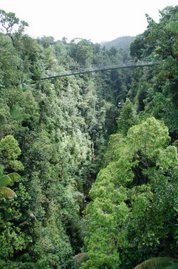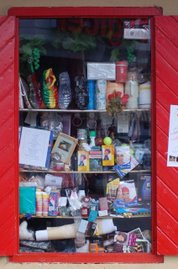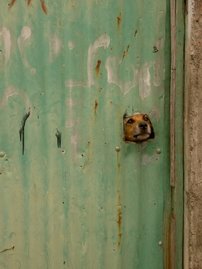Friday, 20 July 2007
Dominican facts, from those who know...
To get some true, real and completely objective information and statistics on Dominica, is probably just as impossible as everywhere else. It all depends on who you are asking and what the purpose is or have been. But still, some institutions seem to never get enough of collecting statistics and writing reports on those objective facts.
The UNDP Human Development Index sometimes serves as quite a good guide. It is based on adult literacy, school enrolment, life expectancy at birth and per capita GDP. According to the 2006 Report 2006, Dominica is ranked 68 among 177 countries, placing it just above countries like Brazil, Colombia and St Lucia, and among the top five of countries considered “medium developed”. Dominica have, in fact, met almost all of the UN Millennium Development Goals.
But, even though Dominica was ranked 95th in the 2004 report, and the jump to no 68 may seem like a really good shape-up, everything is not perfect, not even in Dominica.
The recent and quite severe economic crisis has led to a rise in poverty and unemployment. The poverty and unemployment levels are quite high, with an estimated 39% of the population being poor and 15% indigent; and an unemployment rate of around 25% nationwide and 40% among the poor. As so often, poverty is concentrated mainly in the rural areas and is particularly severe in the Carib Territory, where the majority of the indigenous Kalinago people live. The high level of rural poverty has its roots mainly in the ongoing decline in agriculture which has long been the mainstay of Dominica’s economy. Today, the Government does what is standard in the Caribbean: doing its best to increase tourism as a main source of income for the country.
Unemployment is one of several reasons why the emigration from Dominica continues to increase. From 1990 it has almost doubled. 1990 about 1% of the population emigrated, while as in 2003 about 2% decided to leave the country. The main destinations for migrants are Antigua and British Virgin Islands, as well at UK, USA and Canada. Today Dominica has a population of about 70.000. I have been told that there are about the same number of Dominicans living abroad. The loss of skilled labour force is a great challenge to the island and its future economic development.
Then what about those who come, at least to visit? (although some of us can’t help but to stay…) In 1994 Dominica counted a total of 56,600 stay-over guests, increased by almost 50% ten years later: In 2004 80,000 stay-over tourists visited the island. Today that number has risen slightly more, to about 83,000. However, more than half of them, about 50,000, originate from other Caribbean countries, only about 20,000 travel from US and Canada, about 10,000 from Europe, and only about 40% use paid accommodations. A great part of the people visiting Dominica seem to belong to the fastest growing segment of today’s traveller; those who travel to visit friends and family. Of course, they are also tourists, but doesn’t contribute economically in the same way as those who actually use the hotels and restaurants.
While the cruise shippers outnumber the stay-over visitors by five – almost 400,000 cruise shippers visit every year, with high season days with four or five ships docking in Roseau and Portsmouth (don’t forget to avoid places like Trafalgar Falls and the Emerald Pool these days, at least until you hear the sound of the ships horn in the afternoon), they only account for about 20% of all spending. It is not hard to see why the Governments newly approved Tourism Policy clearly focuses on stay-over guests.
GDP per person averages around USD 5.500 per person and... that’s enough... enough from all these experts who adore hard facts, statistics and everything that is “objectively” measurable. Let’s go back to where we started and concentrate on what really matters:
Dominica is the fourth happiest country in the entire world.
I really think that’s enough to know. And, although I haven’t counted, I am sure a Dominican smiles about a hundred times more a day than the average Swede, German or Canadian.
More hard facts and stats on Dominica: Can be found in the UNDP Human Development Report and Index, in country reports etc. on Dominica, i.e. at the World Bank, the International Monetary Fund, the European Commission, the Caribbean Development Bank, and, last but not least, in the Happy Planet Index.
According to them, if you are curious, the only countries considered happier than Dominica are, in order of major happiness, Vanuatu, Colombia and Costa Rica.
Tuesday, 3 July 2007
Caribbean as it used to be?
Roseau is a town that still hasn’t suffered from hardcore, development aid funded, well paid restaurateurs who have transformed the buildings to dollhouses, the streets to artificial tourist shopping streets, the town to a museum, to a so called “export-ready” heritage site. Roseau is still alive, full or real people, running real errands, living in real houses. I really don’t know how the Caribbean used to be, but I get the feeling Roseau is quite a bit as it used to be. Maybe with more cars.

The other day we were having lunch at the Fort Young Hotel. Up on the second floor veranda we started talking to the people at the table next to ours. Visiting from St Martin for the weekend they wanted tips on where to go for a couple of day tours. We talk about Trafalgar Falls, Soufriere hot springs, going snorkeling at Champagne or Scots Head, and more. And then come to ask them how they like it so far. “Oh”, says the young woman, “its great, it remains me of Saint Martin twenty years ago. I really, really hope it can remain this way.” Dominica’s population is about 70.000, compared with same size Martinique’s 450.000 or St Marten with the same amount of inhabitants, on 15% the size of Dominica. As soon as you leave Roseau, there is a more or less total absence of large development projects, the little villages remains little villages where life remain rural and slow, just as it always have used to be. The absence of international hotel chains, charter tourists, golf courses and international airport helps, of course, to contribute to all this. And Dominica’s newly approved Tourism Policy states that “Dominicas extraordinary tourism resources cannot be experienced without exploring the country” and that all tourism should benefit the local communities. However, both the Prime Minister and the Minister of Tourism seem interested in playing golf, and change is, always, inevitable. And definitely not always bad.
The absence of international hotel chains, charter tourists, golf courses and international airport helps, of course, to contribute to all this. And Dominica’s newly approved Tourism Policy states that “Dominicas extraordinary tourism resources cannot be experienced without exploring the country” and that all tourism should benefit the local communities. However, both the Prime Minister and the Minister of Tourism seem interested in playing golf, and change is, always, inevitable. And definitely not always bad.
This month the EU-funded 6 million euro “Eco-Tourism Development Programme” just finished. The programme has enabled for the upgrade of more than 20 tourist sites, shape-ups of certain areas in Roseau, training and awareness building on the importance of tourism for local communities and a lot more. The work constantly carried out by S.H.A.P.E., the society for heritage architecture preservation and enhancement, have resulted in a greater awareness of the beauty of many of the historical buildings, and in the importance of preserving this heritage and its memories, to progress slowly and with care.
Dominica is an island with many nicknames. The most common must be “the Nature Island of the Caribbean”, or, as the official website now states, just “the Nature Island”. Dominica’s nature is incredible, and it is worth visiting just for experiencing all the different shades of green, I still cant believe there are so many, but Dominica has even more to offer than nature. The ride through narrow, winding roads, short breaks at small hilltop villages, a fruit juice or cup of bush tea, a kubuli and some fish and provision at the very local restaurant or little café, the warmth of the people. These are the real experiences. It is Caribbean as it used to be. Or maybe it is Dominica - Caribbean just the way it is.
Friday, 22 June 2007
Island Time: Meetings
A meeting never starts on time. From my experience at work, I can just say that if there is ever a meeting, it is great. There is always a big possibility that the meeting will be canceled, due to any kind of reason, such as weather, stomach ache, transportation break down, or by simply being forgotten. Soon you learn, reconfirmation is mandatory.
Let's say there is finally going to be a meeting. How late will it start? Again, from my observations at work, it is about 30 to 40 minutes. This morning we had a meeting, supposed to start at 9:00 a.m., and actually, it started at 9:40. Of course there is nobody there at 9:00 a.m. In Central America, where my previous experience is from, the delay was normally 15 to 20 minutes, so Dominica is even more "flexible" than that.
Another thing is about how a meeting is called and how everyone is informed. And for how long in advance. This, I think, is another challenge for non-islanders. Again, the meeting this morning, I was informed about 2 minutes before it started. My boss said "oh, I think I did not tell you, but can you come to the meeting now?". Fortunately I did not have to do anything, just sit there.
It is not that easy to schedule anything in advance on the island. If someone want to have a meeting with you, he or she may say "I will look you up sometime next week". Then he will probably specify more later, like "early next week". Well, that can be Monday, Tuesday, maybe Wednesday. All you can do is hold the uncertainty. Because next week, he will say "how about Tuesday? How about Tuesday mid-morning?". That probably means 10:00, or 10:30, or 11:00. Eventually the meeting will take place around that time.
For many Dominicans it does not feel good, and it does not seem "appropriate" to make an appointment like in Western society. A normal phrase for me, like "let's have a meeting Thursday July 5th at 10:45 a.m." just doesn’t work here.
 So if you want to be on this island and you are punctual person, you have to prepare yourself. Bus comes when it comes, air plane leaves when it leaves. And I am not kidding. Just don't hassle islanders with questions like "when is the bus coming? At what time? It is already late! I can not miss the flight. I have another appointment!" You just have to disconnect from the busy developed world. "When? What time?" are almost taboo questions here.
So if you want to be on this island and you are punctual person, you have to prepare yourself. Bus comes when it comes, air plane leaves when it leaves. And I am not kidding. Just don't hassle islanders with questions like "when is the bus coming? At what time? It is already late! I can not miss the flight. I have another appointment!" You just have to disconnect from the busy developed world. "When? What time?" are almost taboo questions here.On the island, bus comes when it comes, air plane leaves when it leaves.
.

Tuesday, 12 June 2007
Welcome
Enjoy.





